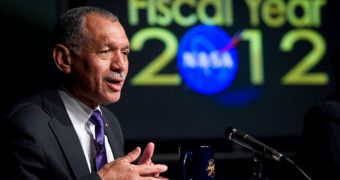According to the 2012 budget request that the White House and the Obama Administration proposed, a host of federal agencies in the United States, including NASA, will have their spendings maintained at 2010 levels in the coming year.
The new document proposes that NASA get about $18.7 billion in 2012, a $300 million drop from the amount it received in the 2011 budget proposal. These measures are not punitive towards NASA.
Rather, they are part of a larger plan that American authorities plan to implement, in which non-security discretionary spending will be reduced, or entirely frozen up, for the next five years.
When it came to NASA, some House legislators wanted an even sharper cut. They wanted to reduce funding levels by an additional $300 million beside what the White House is now proposing.
“The times today are very difficult fiscally, and we're going to live within a budget. What we do has to be affordable, sustainable, and it has to make sense,” said on February 14 in a press conference Charles Bolden, the NASA Administrator.
At this time, however, the actual amount of money that the American space agency will get is still uncertain. The 2012 budget proposal first has to pass through Congress, where it's bound to suffer some modifications.
The new fiscal year begins on October 1, 2011, and so the White House proposal needs to be debated, amended, and approved by that time. “The fiscal realities we face require hard choices,” US President Barack Obama said in a statement.
“A decade of deficits, compounded by the effects of the recession and the steps we had to take to break it, as well as the chronic failure to confront difficult decisions, has put us on an unsustainable course,” the Commander-in-Chief added.
“That's why my budget lays out a path for how we can pay down these debts and free the American economy from their burden,” he went on to say, Space reports.
What's interesting for analysts is that the new 2012 proposal comes at a time when NASA and a host of other federal agencies are operating under a continuing resolution, a type of measure that ensures the continuation of operations at previous funding levels until a new budget can be approved.
“I don't know what will be in the budget, but I hope that it will be adequate to move forward exploration and commercial crew to [low-Earth orbit] development,” former astronaut Leroy Chiao said on February 11, before the proposal was announced.
“These are the two most important components of forward U.S. HSF [Human Space Flight] plans,” he concluded.

 14 DAY TRIAL //
14 DAY TRIAL //